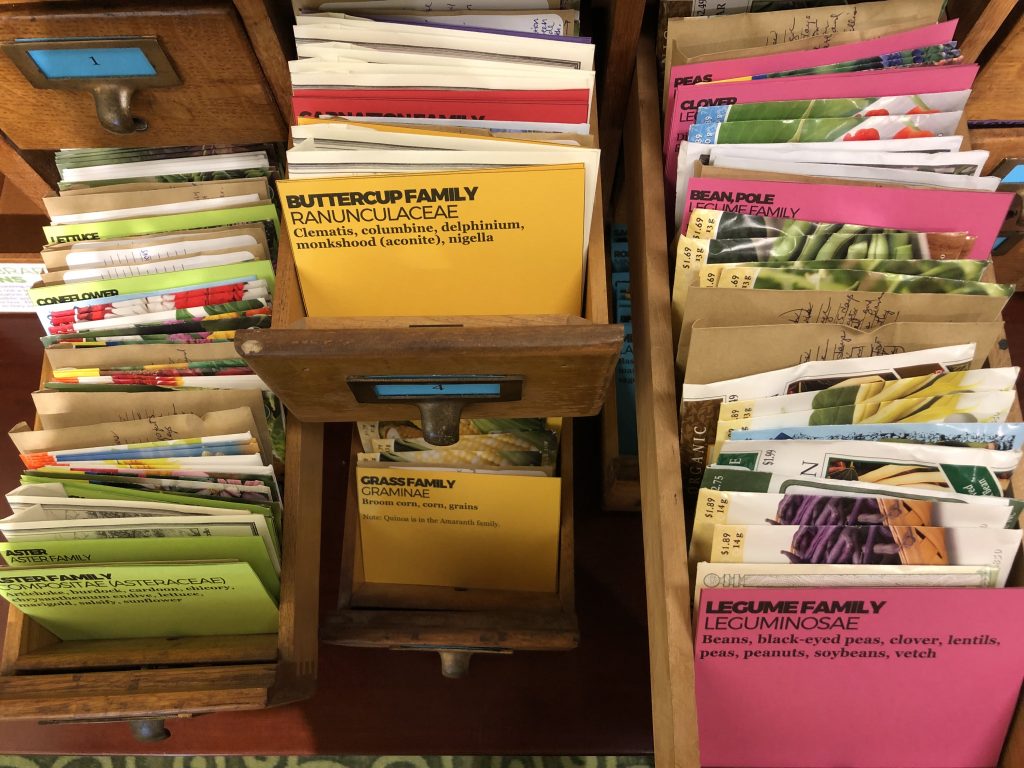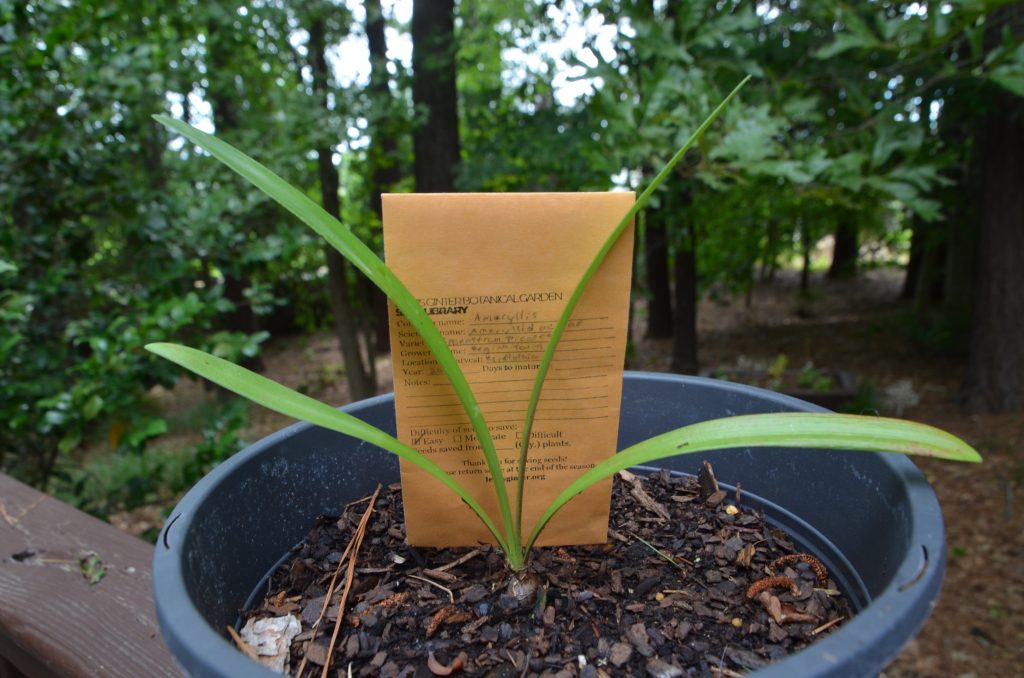Plant Seeds: A Seed Library
Right before the pandemic, Lewis Ginter Botanical Garden started a Seed Library. It’s a place where you can “check out” and “borrow” seeds just like you would a book at a library. Only we don’t expect you to return the same exact seeds. We hope that you will take the seeds home, sow them in your own garden, and bring us back the seeds from that plant to share with others. Plant seeds, sow them, harvest the flowers or fruit, and then return a few seeds at the end. Expand your collection, and repeat. Plus, it’s free!

A glimpse into the Seed Library in the Lora Robins Library. On plant sale weekend, you’ll also find it at Fall PlantFest outside!
This is a perfect project for us because the mission of Lewis Ginter Botanical Garden is to connect people and plants to improve the community. The Seed Library does just that. As plant people, we love spreading plant joy to all who want to grow and learn. We also love that we can offer this service for free to the community at this weekend’s plant sale, Fall PlantFest. Best of all, the donations of seeds to our library are from you. Yes, you and your neighbors, but also our volunteers, members, a few that we bought just because we like them, and most importantly, our horticulturists. Because, when we think about it, there are few people who geek out about plants more than we do!
You will find some true treasures in the Seed Library — like coneflower (Echinacea purpurea) donated from the garden of Senior Horticulturist Shannon Smith, or ground cherries (Physalis peruviana) from one of our member families that were handed down from their family in Russia. (Please keep in mind that the selection is constantly changing so these seeds may no longer be available.) We love that the seed library spreads plant diversity too — we have a focus on heirloom seeds. As we mentioned, the seed library is pretty simple and operates like a typical library. You check out the plant seeds of your liking, take them home, and plant them. Once the seed has grown into its own plant, you then take those seeds and return them to the Library. Library and Archives Manager Katarina Spears says there is no obligation to return seeds if things don’t work out. Some plants are more challenging than others from which to save seeds. But to make it easier for you, we do rank the seeds by easy, medium, or difficult depending on your expertise level.
We are intentional about including plants that make it easy for users to harvest seeds. One goal of the library is to be a community resource. Another goal is to teach about seed-saving and why it is important. Our hope is to eventually make the Seed Library mobile and to visit locations throughout the Richmond region so we can share seeds (and seed-saving practices) with people throughout our community. Spears explains that the seed library also helps with our community’s plant biodiversity. “If you don’t have diversity in your food crops and we’re all relying on the same corn and that particular corn is attacked by a disease then we can’t feed ourselves. So that biodiversity is really important.” Spears says. An underlying purpose of taking the seeds home to grow your own plant is to keep the lessons that you’ve learned going. With each growing cycle, there’s an opportunity to teach into another.
The knowledge of the Seed Library is something that we hope gets passed down for years to come. “All these lessons are really easy to express through something as interesting as a Seed Library,” Spears says. “Then you can take them home and it’s an activity you can do with your family. It’s an education process that can continue for months or years after you’ve made that initial introduction to these topics.”
In its short time since its creation, the Seed Library has already had an impact. Garden volunteer Laura Jones explains, “My favorite part of the Seed Library concept is twofold. One, it’s personal, as in the seeds connect me with people. Two, it’s a chance to grow unusual things.” Jones has volunteered with the seed library since it opened in 2019. She has posted about it in our Garden Member’s Facebook group and also answers questions from visitors. Sometimes those curious about starting a Garden get nervous thinking the process is hard, but Jones explains how easy it can be.

Jones’s amaryllis plant will take 5 years before it is ready to bloom. It is a “fun project” and an exercise in patience.
Jones also actively checks out seeds from the Seed Library for her own personal Garden. “I like the idea of growing things that came from Lewis Ginter Botanical Garden. My seed story is that in 2019 I checked out the amaryllis seeds. I managed to get two to germinate.” One of her longest-standing projects is the nurturing of those Hippeastrum seeds. “I lost one plant but the other is doing well, it’s in the photo with the orange envelope. The envelope is what is used when checking them out and I use it to record things like how many leaves, when, etc.”
For Amaryllis, it’s a five-year process of seed to bloom. While this can be seen as tedious to some, Jones says she sees it as “a fun project.” This project has helped her revitalize post quarantine life and to connect to other visitors in the Garden. “The other day I was volunteering and the woman who donated the amaryllis seeds was too and we started talking. The flower that produced them was a gift from a fellow graduate student so it had special meaning to her.” Jones has also gone on to grow more plants because of the Seed Library such as blackberry lily, also known as Iris domestica and she donated columbine (Aquilegia) from her own garden.
If you are interested in growing plants or would just like to check out seeds, just come see us at this year’s Fall PlantFest on Sept. 17-18, 2021, or come see us in the Library between Monday and Saturday, 10 a.m. – 4 p.m. Your own personal garden is just one visit away.
Lewis Ginter Fall PlantFest Plant Sale
Friday, September 17, and Saturday, September 18, 2021
Friday, 9 a.m. – 5 p.m.; Saturday, 9 a.m. – 3 p.m.